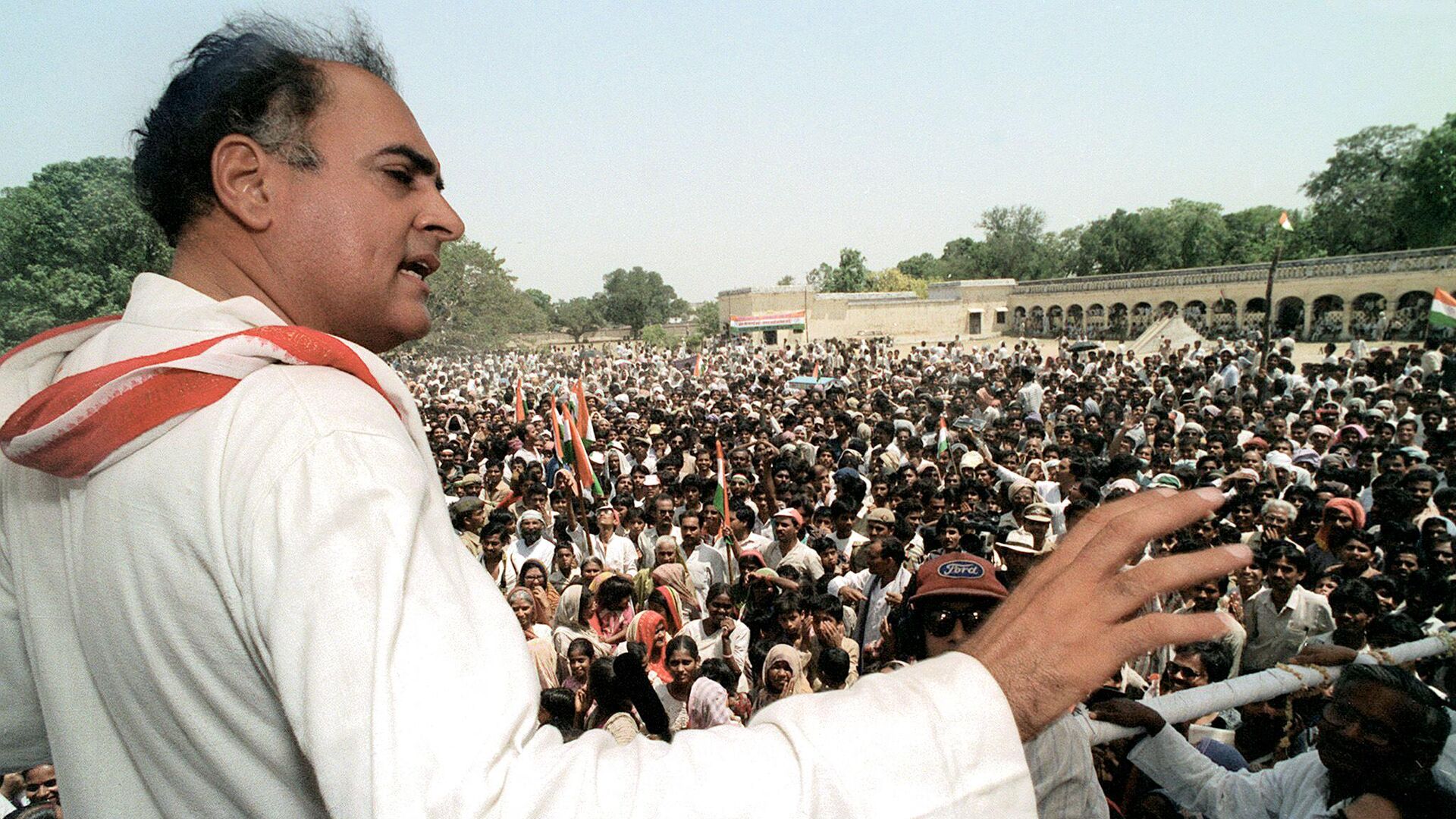https://sputnikglobe.com/20220518/indias-top-court-orders-release-of-ex-prime-minister-rajiv-gandhis-assassination-convict-1095600272.html
India’s Top Court Orders Release of Ex-Prime Minister Rajiv Gandhi’s Assassination Convict
India’s Top Court Orders Release of Ex-Prime Minister Rajiv Gandhi’s Assassination Convict
Sputnik International
Ex-Prime Minister Rajiv Gandhi was assassinated on 21 May 1991 in Sriperumbudur, a town in Tamil Nadu. A crime branch team of the Criminal Investigation... 18.05.2022, Sputnik International
2022-05-18T12:22+0000
2022-05-18T12:22+0000
2022-12-08T16:32+0000
supreme court of india
crime
law
law
law
https://cdn1.img.sputnikglobe.com/img/07e6/05/12/1095602470_0:0:2049:1153_1920x0_80_0_0_ed5320c186f442704593e87a3938eeb2.jpg
The Supreme Court of India on Wednesday ordered the release of AG Perarivalan, one of the convicts in former Prime Minister Rajiv Gandhi's assassination case.Perarivalan has been behind bars for 31 years since his arrest by the Special Investigation Team (SIT) of the Central Bureau of Investigation (CBI) in 1991.Talking to the media after the verdict was announced, Perarivalan said: “Truth and justice were on our side. This wouldn't have happened without the support and love of the people.”Perarivalan, who was only 19 years old when Congress leader Gandh was assassinated, was accused of buying the two 9-volt batteries used in the bomb to kill the former Prime Minister of India.Perarivalan had bought batteries for Sivarasan, the member of the Liberation Tigers of Tamil Eelam (LTTE) who masterminded the assassination.An anti-terrorism court in India sentenced Perarivalan to death in 1998. However, his death sentence was commuted to life imprisonment in 2014.In March this year, the Supreme Court granted him bail after which Perarivalan appealed, seeking an early release from jail.His plea for early release was opposed by the federal government which said that the Governor of Tamil Nadu state had referred the matter to the country's President Ram Nath Kovind, who has yet to take a call on it.The delay in the matter and the Governor’s action was questioned by the Supreme Court. It observed that the Governor is bound by the cabinet decision to release all seven convicts in the case, granting them pardon under Section 161 of the Indian Constitution, and hence it would not wait for the President's response though the Governor had forwarded the file to the President's Office.In the hearing last week, the Supreme Court had rebuked the federal government when the latter argued that in cases of granting mercy, only the President had executive powers.Responding to its argument, the top court said that this would mean any clemency granted by a governor over all these past years would be unconstitutional.The top court’s verdict to release Perarivalan is likely to pave the way for the release of the other six convicts in the case, including Nalini Sriharan and her husband Murugan, a Sri Lankan national.Rajiv Gandhi Assassination CaseRajiv Gandhi, the former Prime Minister of India, was assassinated by a female suicide bomber, Thenmuli Rajaratnam, or Dhanu, in Sriperumbudur, a town in Tamil Nadu on 21 May, 1991.Seven people were convicted in the case and all of them were sentenced to death. However, the Supreme Court in 2014 commuted the sentences to life terms, citing inordinate delay by the Indian President in deciding on their clemency pleas.The state cabinet of the Tamil Nadu government under former state chiefs Jayaram Jayalalithaa and Edappadi Karuppa Palaniswami recommended the release of the convicts in 2016 and 2018, respectively. But the governors didn’t follow their advice.Perarivalan was in solitary confinement for many years. He earned several academic qualifications during the long incarceration and also authored a book.Though Perarivalan claimed all along that he wasn't aware what the batteries he'd been asked to get would be used for, years later a retired CBI officer apologised saying that he had altered Perarivalan's confession.
Sputnik International
feedback@sputniknews.com
+74956456601
MIA „Rossiya Segodnya“
2022
Rahul Trivedi
https://cdn1.img.sputnikglobe.com/img/07e5/05/12/1082926121_0:-1:627:627_100x100_80_0_0_d882e1a63f627c25b7a534fb8b8234d7.jpg
Rahul Trivedi
https://cdn1.img.sputnikglobe.com/img/07e5/05/12/1082926121_0:-1:627:627_100x100_80_0_0_d882e1a63f627c25b7a534fb8b8234d7.jpg
News
en_EN
Sputnik International
feedback@sputniknews.com
+74956456601
MIA „Rossiya Segodnya“
Sputnik International
feedback@sputniknews.com
+74956456601
MIA „Rossiya Segodnya“
Rahul Trivedi
https://cdn1.img.sputnikglobe.com/img/07e5/05/12/1082926121_0:-1:627:627_100x100_80_0_0_d882e1a63f627c25b7a534fb8b8234d7.jpg
supreme court of india, crime, law, law, law
supreme court of india, crime, law, law, law
India’s Top Court Orders Release of Ex-Prime Minister Rajiv Gandhi’s Assassination Convict
12:22 GMT 18.05.2022 (Updated: 16:32 GMT 08.12.2022) Ex-Prime Minister Rajiv Gandhi was assassinated on 21 May 1991 in Sriperumbudur, a town in Tamil Nadu. A crime branch team of the Criminal Investigation Department was formed to investigate the case. However, the case was later handed over to a special team at India's top investigative agency, the CBI, which arrested Perarivalan on 11 June 1991.
The Supreme Court of India on Wednesday ordered the release of AG Perarivalan, one of the convicts in former
Prime Minister Rajiv Gandhi's assassination case.
Perarivalan has been behind bars for 31 years since his arrest by the Special Investigation Team (SIT) of the Central Bureau of Investigation (CBI) in 1991.
Announcing the verdict, a bench headed by Supreme Court judge, Justice Lavu Nageswara Rao, said: "State cabinet had made its decision based on relevant considerations. In exercising Article 142, it is appropriate to release the convict."
Talking to the media after the verdict was announced, Perarivalan said: “Truth and justice were on our side. This wouldn't have happened without the support and love of the people.”
Perarivalan, who was only 19 years old when Congress leader Gandh was assassinated, was accused of buying the two 9-volt batteries used in the bomb to kill the former Prime Minister of India.
Perarivalan had bought batteries for Sivarasan, the member of the Liberation Tigers of Tamil Eelam (LTTE) who masterminded the assassination.
An anti-terrorism court in India sentenced Perarivalan to death in 1998. However, his death sentence was commuted to life imprisonment in 2014.
In March this year, the Supreme Court granted him bail after which Perarivalan appealed, seeking an early release from jail.
His plea for early release was opposed by the federal government which said that the Governor of Tamil Nadu state had referred the matter to the country's President Ram Nath Kovind, who has yet to take a call on it.
The delay in the matter and the Governor’s action was questioned by the Supreme Court. It observed that the Governor is bound by the cabinet decision to release all seven convicts in the case, granting them pardon under
Section 161 of the Indian Constitution, and hence it would not wait for the President's response though the Governor had forwarded the file to the President's Office.
In the hearing last week, the Supreme Court had rebuked the federal government when the latter argued that in cases of granting mercy, only the President had executive powers.
Responding to its argument, the top court said that this would mean any clemency granted by a governor over all these past years would be unconstitutional.
The top court’s verdict to release Perarivalan is likely to pave the way for the release of the other six convicts in the case, including Nalini Sriharan and her husband Murugan, a Sri Lankan national.
Rajiv Gandhi Assassination Case
Rajiv Gandhi, the
former Prime Minister of India, was assassinated by a female suicide bomber, Thenmuli Rajaratnam, or Dhanu, in Sriperumbudur, a town in Tamil Nadu on 21 May, 1991.
Seven people were convicted in the case and all of them were sentenced to death. However, the Supreme Court in 2014 commuted the sentences to life terms, citing inordinate delay by the Indian President in deciding on their clemency pleas.
The state cabinet of the Tamil Nadu government under former state chiefs Jayaram Jayalalithaa and Edappadi Karuppa Palaniswami recommended the release of the convicts in 2016 and 2018, respectively. But the governors didn’t follow their advice.
Perarivalan was in solitary confinement for many years. He earned several academic qualifications during the long incarceration and also authored a book.
Though Perarivalan claimed all along that he wasn't aware what the batteries he'd been asked to get would be used for, years later a retired CBI officer apologised saying that he had altered Perarivalan's confession.


